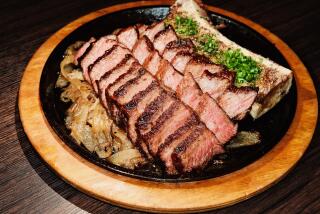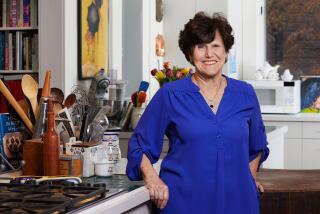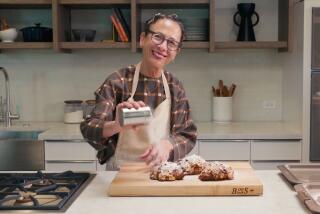Chef Edward Lee meets home cooks and records their stories in his road trip book, ‘Buttermilk Graffiti’
Edward Lee may be a multi-year James Beard Award nominee and “Top Chef” competitor, but the subjects of his new book, “Buttermilk Graffiti: A Chef’s Journey to Discover America’s New Melting-Pot Cuisine,” aren’t culinary celebrities; they’re the family restaurant owners and home cooks that he met while while eating his way across the country. What interests him is the origin story of a meal — and of the person who prepared it.
“To me, when you eat something delicious, that’s the beginning,” Lee says by phone. “Whenever I eat something that’s truly transformative, I want to unravel it all, and it starts with the person cooking.” That included, in Lowell, Mass., a Cambodian chef, and in Clarksdale, Miss., Lebanese sisters who make cabbage rolls.
Lee, a Korea-born chef raised in New York, is known for embracing the cuisine of the American South; he is chef and owner of two restaurants in Louisville, Ky., and the culinary director of restaurants in Washington, D.C., and Maryland. He spent two years road-tripping to unlikely food destinations to stitch together a tapestry of American cuisine.
“I wanted to put myself in places of discomfort,” he said. “If a Korean kid from Brooklyn can be in the good graces of the South in Louisville, Ky., I can talk my way into anyone’s culture.” How? Lee said it’s all about embracing humility. “I didn’t want to come at it from a place of authority,” he said. “It’s OK to not know about something. It’s OK to make some mistakes culturally, and it’s OK to offend people if you’re doing it in the bigger picture to try and learn.”
In that spirit, Lee visited Dearborn, Mich., which has a large Arab American population. Following a humbling conversation in a Middle Eastern bakery, he made an unlikely choice for a chef and food writer: He decided that the most authentic way to experience the region’s cuisine during Ramadan was fasting.
“Sometimes, before you even get to the food, you have to dance around the culture,” said Lee. “I would never have gone to a mosque if it weren’t for writing a food story.” At sundown after his fast he sipped mint tea in a Syrian restaurant, writing, “it is as if I have never tasted mint before. It is so sharp, so singular.”
Lee’s elevation of the often anonymous people behind the food we eat speaks to his concern with not just style, but substance.
“Maybe the lady in the home kitchen isn’t doing something with a vacuum sealer,” he says of the untrained cooks he met while researching “Buttermilk Graffiti,” “but I can tell you the food I ate on these trips was as good anything I’ve eaten in any restaurant.” Their resourcefulness moved him. “I can’t tell you how many times I actually cried, or was on the verge of crying, listening to these people and their stories and their devotion to food,” he said.
Those stories are often inextricable from stories of immigration, tradition and assimilation. “What I found was in smaller towns and smaller places, you still find authentic food, but [the cooks] also have to weave their way around this thing called America culture.”
In Mississippi, Lee discovers a Lebanese kibbeh made with beef, not lamb, because beef is cheaper and a local favorite. In Westport, Conn., he learns the technique for preparing Moroccan smen — a kind of fermented butter — from a recent immigrant from Marrakesh. She teaches Lee to use the traditional thyme as a flavoring, but his “mind wanders to what other flavors could work: basil, red peppercorn, corn cobs. This is the difference between us. She has a tradition; I don’t.”
To Lee, the concept of authentic versus fusion cooking feels thorny; everything is a mash-up. “Maybe part of being American is releasing the anchor that we have to our heritage,” he writes. “Maybe it is this very conflict that defines who we are.” In other words, American cuisine is indefinable precisely because in trying to define it, he says, “you’re also asking: What is America?”
That’s not a question he felt equipped to answer in “Buttermilk Graffiti.” The process of writing his first work of narrative nonfiction was challenge enough, but in some sense not an unfamiliar one.
“Coming up with a sentence is very similar to coming up with a dish. You have almost infinite words at your disposal and you have almost infinite ingredients. The hardest thing to do is to start with an empty page,” he said, “or to start with an empty plate.”
Edward Lee will appear at 2 p.m. April 21 at the Festival of Books on the panel “Food: The New Culture” with Andrew Friedman (“Chefs, Drugs and Rock & Roll”) and Dan Stone (“The Food Explorer: The True Adventures of the Globe-Trotting Botanist Who Transformed What America Eats”), moderated by Gustavo Arellano.

More to Read
Sign up for our Book Club newsletter
Get the latest news, events and more from the Los Angeles Times Book Club, and help us get L.A. reading and talking.
You may occasionally receive promotional content from the Los Angeles Times.







